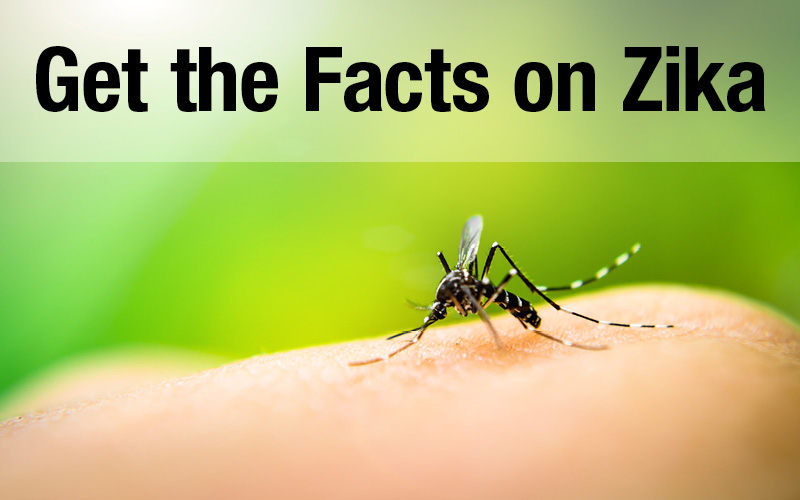Get the Facts on Zika
The World Health Organization (WHO) has issued a Zika Strategic Response Plan to address the Zika virus outbreak. WHO has declared Zika a public health emergency of international concern and according to the CDC, Zika is a nationally notifiable condition. Zika’s long term effects, such as associated birth defects, could become a potentially challenging global issue. Therefore, healthcare providers should report suspected Zika virus disease to the health department(s) who will then confirm laboratory results and report probable cases to the CDC.
In order to prevent the further spread of the virus, healthcare providers must provide their patients with the most current information. Recently, the CDC published an infographic on the “Top 5 Things Everyone Needs to Know About Zika” which could be easily posted in patient areas.
Here are more specific details on the CDC’s Top 5:
1. Transmission
Transmission to individuals is generally by mosquito bite. The mosquitoes are infected by biting individuals who have the virus and subsequently biting non-infected individuals, transmitting the virus. A pregnant woman can pass the virus on to the fetus during pregnancy, however there are no reported cases of passage of Zika virus through breast feeding. Zika can also be transmitted sexually. Investigation remains in progress to evaluate possible transmission via blood transfusion. Only one reported case of laboratory-acquired Zika has been documented in the US and the route of transmission is unknown.
2. Prevention
No vaccine is available for Zika.
The CDC recommends using an EPA-registered insect repellent that contains DEET, Picaridin (KBR 3023), Bayrepel, icaridin, Oil of lemon eucalyptus (OLE), para-menthane-diol (PMD) or IR3535. The OLE and PMD products should not be used with children under 3 years of age and no repellent should be applied to babies under 2 months of age.
Mosquito exposure to the skin can be controlled with appropriate clothing as well as treating clothing and gear with Permethrin. If air conditioning is not available, window screens and/or mosquito netting should be used. Empty containers with stagnant water, as this could be a breeding ground for mosquitoes.
Unlike typical mosquitoes, those that spread Zika, Chikungunya and Dengue are unusually aggressive and tend to be daytime biters. The incubation period is 3-14 days and viremia ranges from days to 1 week. Most of the infected individuals will have no symptoms or very mild symptoms, likely unaware that they are even infected. Symptoms generally clear within a week and don’t usually cause an ER visit or hospital admission.
3. Birth Defects
Zika virus during pregnancy is a different story. Research continues but Zika is considered a cause of birth defects specifically microcephaly, eye defects, hearing loss and impaired growth. A woman who is not pregnant at the time of Zika infection will clear the virus, likely benefiting from immunity to possible re-infection. Fortunately, there is no evidence to suggest any risk to future pregnancy.
In addition to the risk to pregnant women, there are a small number of infected individuals who have developed muscle weakness and paralysis. Only a few of have suffered permanent damage; the CDC believes there is a strong association between Zika and Guillain-Barre’ syndrome.
4. Pregnant Women Should Not Travel to Areas with Zika
As of Aug 24, 2016, Florida remains the only U.S. state with locally acquired infection; 29 identified cases thus far. However, there are 8,000 locally acquired cases reported in the U.S. territories; American Samoa, Puerto Rico and Virgin Islands. Travel-associated cases are now up to 2,246 which have been reported in every state, most numerous in New York, Florida, California and Texas. Travel notices have been posted as “Alert Level 2, Practice Enhanced Precautions” to areas in Central and South America, Caribbean, Mexico, the Pacific Islands and Cape Verde which have reported local mosquito transmission to people.
5. Returning Travelers Infected with with Zika Can Spread the Virus Through Mosquito Bites
A blood or urine test should be performed to confirm Zika and diagnosis depends on the result, symptoms and travel history. CDC recommends Zika virus testing for people who may have been have exposed to Zika through sex and have symptoms. Any pregnant woman with possible exposure to Zika via sex should be tested. This possible exposure includes a partner who has traveled to or lives in an area with Zika.
Researchers and epidemiologists continue to better understand the Zika virus. As of the end of July 2016, the CDC produced this summary of their findings.







